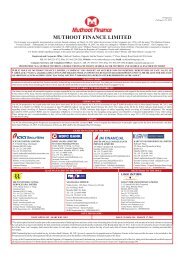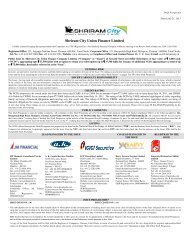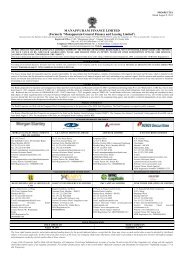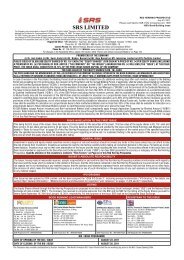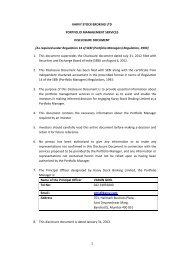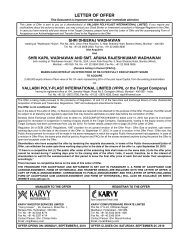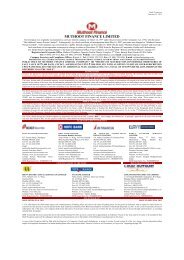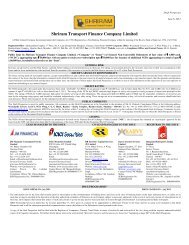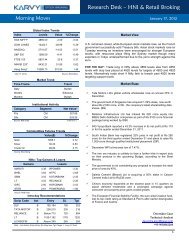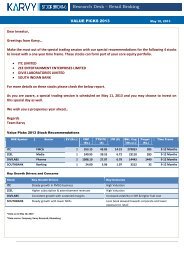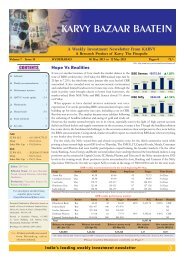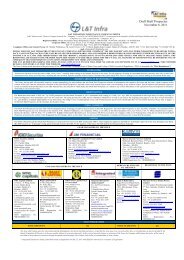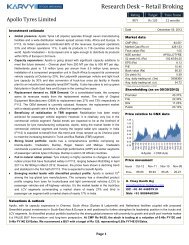APR Constructions Limited - Saffron Capital
APR Constructions Limited - Saffron Capital
APR Constructions Limited - Saffron Capital
Create successful ePaper yourself
Turn your PDF publications into a flip-book with our unique Google optimized e-Paper software.
KEY REGULATIONS AND POLICIES<br />
Our Company is into Infrastructure segment in India. Our Company undertakes infrastructure activities in Irrigation,<br />
Railways and Industrial Infrastructure segment. Our Company undertakes projects which are awarded either by<br />
Central & State government bodies / agencies, Public Sector Enterprises and Private Sector Enterprises. The<br />
following description is a summary of some of the relevant regulations and policies as prescribed by the Government<br />
of India. The summary of regulations set out below is not exhaustive, and is only intended to provide general<br />
information to the investors and is neither designed nor intended to be a substitute for professional legal advice. There<br />
are no specific regulations in India governing the infrastructure industry.<br />
Taxation statutes such as the Income Tax Act, 1961, Central Sales Tax Act, 1956 and applicable local sales tax<br />
statutes, labour regulations such as the Employees‟ State Insurance Act, 1948 and the Employees‟ Provident Fund and<br />
[Miscellaneous Provisions] Act, 1952, and other miscellaneous regulations and statutes such as the Trade Marks Act,<br />
1999 apply to us as they do to any other Indian company. The statements below are based on the current provisions of<br />
Indian law, and the judicial and administrative interpretations thereof, which are subject to change or modification by<br />
subsequent legislative, regulatory, administrative or judicial decisions. For details of government approvals obtained<br />
by us, see the section titled “Government And Other Approvals” beginning on page 191 of this DRHP.<br />
1. Contract Labour (Regulation and Abolition) Act, 1970<br />
The Contract Labour (Regulation and Abolition) Act, 1970 (“CLRA”) has been enacted to regulate the employment<br />
of contract labour in certain establishments, the regulation of their conditions and terms of service and to provide for<br />
its abolition in certain circumstances. The CLRA applies to every establishment in which 20 or more workmen are<br />
employed or were employed on any day of the preceding 12 months as contract labour. The CLRA vests the<br />
responsibility on the principal employer of an establishment to which the CLRA applies to make an application to the<br />
registering authority in the prescribed manner for registration of the establishment. In the absence of registration, a<br />
contract labour cannot be employed in the establishment. Likewise, every contractor to whom the CLRA applies is<br />
required to obtain a license and not to undertake or execute any work through contract labour except under and in<br />
accordance with the license issued.<br />
To ensure the welfare and health of the contract labour, the CLRA imposes certain obligations on the contractor in<br />
relation to establishment of canteens, rest rooms, drinking water, washing facilities, first aid, other facilities and<br />
payment of wages. However, in the event the contractor fails to provide these amenities, the principal employer is<br />
under an obligation to provide these facilities within a prescribed time period. Penalties, including both fines and<br />
imprisonment, may be levied for contravention of the provisions of the CLRA.<br />
2. The Building and Other Construction workers Regulation of Employment and Conditions of Service Act<br />
1996 and The Building and Other Construction workers Welfare Cess Act, 1996<br />
This Act provides for the levy and collection of a cess on the cost of construction, with a view to augmenting the<br />
resources of the Building and other Construction Workers Welfare Boards constituted under the Building and Other<br />
Construction Workers (regulation of Employment and Conditions of Service) Act, 1996. All the establishments who<br />
carry on any building or other construction work and employ 10 or more workers are covered under this Act.All such<br />
establishments are required to pay cess at the rate not exceeding 2% but not less than 1% of the cost of construction<br />
incurred by the employer, as may be modified by the Government. The Employer of the establishment is required to<br />
provide safety measures at the Building or construction work and other welfare measures, such as Canteens, First-Aid<br />
facilities, Ambulance, Housing accommodations for workers near the work place etc. The Employer to whom the Act<br />
applies has to obtain a registration certificate from the Registering Officer appointed by the Government.<br />
3. Payment of Wages Act 1936<br />
The Payment of Wages Act 1936 (“PWA”) makes provisions regarding the date by which wages payable to<br />
employees/ workers are to be paid, when it will be paid and what deductions can be made from the wages of the<br />
workers.<br />
113



